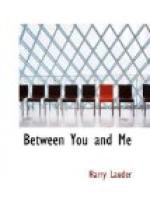We maun all stand together, especially we plain men and women. It was sae that we won the war—and it is sae that we can win the peace noo that it’s come again, and mak’ it a peace sae gude for a’ the world that it can never be broken again by war. There’d be no wars i’ the world if peace were sae gude that all men were content. It’s discontented men who stir up trouble in the world, and sae mak’ wars possible.
We talk much, in these days, of classes. There’s a phrase it sickens me tae hear—class consciousness. It’s ane way of setting the man who works wi’ his hands against him who works wi’ his brain. It’s no the way a man works that ought to count—it’s that he works at all. Both sorts of work are needful; we canna get along without either sort.
Is no humanity a greater thing than any class? We are all human. We maun all be born, and we maun all die in the end. That much we ken, and there’s nae sae much more we can be siccar of. And I’ve often thought that the trouble with most of our hatreds an’ our envy and malice is that folk do not know one another well enough. There’s fewer quarrels among folk that speak the same tongue. Britain and America dwelt at peace for mair than a hundred years before they took the field together against a common enemy. America and Canada stand side by side—a great strong nation and a small one. There’s no fort between them; there are no fichting ships on the great lakes, ready to loose death and destruction.
It’s easier to have a good understanding when different peoples speak the same language. But there’s a hint o’ the way things must be done, I’m thinking, in the future. Britain and France used tae have their quarrels. They spoke different tongues. But gradually they built up a gude understanding of one another, and where’s the man in either country the noo that wadna laugh at you if you said there was danger they micht gae tae war?
It’s harder, it may be, to promote a gude understanding when there’s a different language for a barrier. But walls can be climbed, and there’s more than the ane way of passing them. We’ve had a great lesson in that respect in the war. It’s the first time that ever a coalition of nations held together. Germany and Austria spoke one language. But we others, with a dozen tongues or mair to separate us, were forged into one mighty confederation by our peril and our consciousness of richt, and we beat doon that barrier of various languages, sae that it had nae existence.
And it’s not only foreign peoples that speak a different tongue at times. Whiles you’ll find folk of the same family, the same race, the same country, who gie the same words different meanings, and grow confused and angry for that reason. There’s a way they can overcome that, and reach an understanding. It’s by getting together and talking oot all that confuses and angers them. Speech is a great solvent if a man’s disposed any way at all to be reasonable, and I’ve found, as I’ve gone about the world, that most men want to be reasonable.




